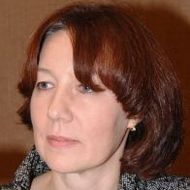‘No One Can Say We’re Going to Replace Old People with Machines’

Experts believe that increasing productivity, diversifying the economy, as well as developing human capital and expanding non-resource exports will help boost Russia's economic growth. But the state policy has to be smart. This was discussed at a series of round tables and expert discussions on the topic of productivity at the XXII April International Academic Conference on Economic and Social Development, organised by HSE University and Sberbank.
Experts from HSE and other universities, both Russian and foreign, discussed problems of productivity growth and their specific nature in Russia. In his report, ‘Perspectives on Productivity: Benefits to Economy, Business, Workers and Society’, Bart van Ark (Productivity Institute, University of Manchester) noted that high productivity benefits millions of people. They get quality jobs, allowing them to increase their wealth, improve their quality of life, and develop the human capital of their children.

Bart van Ark
There is an inverse relationship as well: productivity grows faster in regions with better access to education and healthcare. It is therefore important to give all people access to quality education, decent housing, and digital technology. Contract terms and conditions, social support for employees by employers, and work-life balance are also important prerequisites for high productivity.
Inequality mainly slows productivity growth, but the causality is not always direct. In China, inequality is high, but productivity is rising rapidly. The question of constructing relationships between productivity, wealth, and equality has not yet been sufficiently explored, says Bart van Ark.
Productivity has grown faster in recent years in large companies than in small and medium-sized ones (excluding start-ups). The advent of digital technology has not yet led to a dramatic acceleration in growth, but it may still lie ahead. In the 19th century, it took 80 years to master steam, while the introduction of electricity and the internal combustion engine took 20–30 years. Digital technology may take less than 10 years. But that does not mean that companies are adopting them readily. It is harder for businesses to adopt cloud computing and other innovations than personal computers. The transition to a green economy will not necessarily have an immediate positive impact on productivity, he notes.
The XXII April International Academic Conference on Economics and Social Development will be held from April 13 to 30, 2021. For the first time, the conference is co-organized by HSE University and Sberbank. The programme includes a series of academic and expert discussions that will be held as part of the HSE-Sberbank Discussion Club – an expert platform that brings together academics, business representatives, and public officials to discuss critical economic and social challenges and share best practices in the sphere of business and institutional development, thereby laying out a path to the future.
The average annual growth of productivity between 1995 and 2019 was 3.2%, mainly due to an increase in capital, including new equipment. A substantially smaller and roughly equal role in its increase was played by an increase in the quantity and quality of the labour force. Global labour productivity growth has declined in recent years, not exceeding 2% since 2014.
Last year saw a dramatic dip in productivity at the start of the pandemic followed by a jump in the second and third quarters and slow growth in the fourth with the expansion of remote working and services. The pandemic has accelerated the adoption of digital technologies and digital business transformation. Further growth will depend on many factors, such as the restoration of connections and the desire of companies and countries for greater resilience and independence from potential global disruptions. That said, protectionism will not increase productivity, says the speaker.
Creating high-quality jobs is the responsibility of company leaders, but the authorities can encourage this process by providing a favourable business climate, and introducing insurance and limits on working hours
However, it must not be forgotten that not all jobs can be highly productive. One must take into account that some workers, especially older workers, may not have the skills needed to work and might not have enough opportunities for retraining. So it is better to have low-productivity jobs than none at all, says Bart van Ark.
Lilia Ovcharova, Vice Rector of HSE University and Director of the Institute of Social Policy at HSE University, was interested in what tools could be used to reduce the negative impact of population ageing on productivity. In her view, it is necessary to create a system for retraining older workers and ensure their access to quality medicine. In addition, Bart van Ark stressed that in large companies a combination of employees of different ages is necessary to maintain continuity and create a favourable psychological climate. Companies can introduce part-time work for them, or shorter working hours. ‘No one can say we’re going to replace old people with machines,’ he stressed.

Lilia Ovcharova
Summing up his presentation, Bart van Ark admitted that there is no single effective way to increase productivity. ‘There is no silver bullet to solve the productivity problem,’ he said.
Nobody Is Teaching the Worker
The impact of human capital on labour productivity in Russia was the subject of a report by Lilia Ovcharova and Vladimir Gimpelson, Director of HSE University’s Centre for Labour Market Studies, as part of the work of the Human Capital Multidisciplinary Research Center. The report’s authors attempted to determine why domestic human capital makes an insufficient contribution to the economy and labour productivity.
The speaker, Director of the Centre for Productivity Studies Ilya Voskoboynikov, noted that the low level of return on human capital in Russia is caused by both insufficient demand for it and the nature of its supply. Even during a period of rapid economic and productivity growth, the contribution of human capital was low, and, even in comparison with other former Soviet republics, Russia is not a leader in this indicator.
This phenomenon is largely explained by the peculiarities of the lifecycle of knowledge and skills. Russia has a significant share of workers with higher education (higher, for example, than the USA and South Korea). However, that high initial level is poorly maintained thereafter. Few people are involved in continuing education, significantly less than in developed countries and even in the former socialist states. As a consequence, human capital is seldom renewed. Less than 15% of Russian employees undergo retraining, and this number continues to decline. Moreover, domestic retraining is largely formal, concentrated in large companies and state institutions and concerns mostly people who are themselves involved in professional development: they are managers and highly qualified specialists. The older an employee is, the less chance they have of undergoing retraining. Low-skilled employees also have very limited opportunities to upgrade their skills and lose access to growth.
He also noted the need to improve the human capital and skills of migrants, who play a significant role in the domestic labour market. The Centre for Productivity Studies director noted the need to attract highly-skilled migrants and train them in the professions in which they work in Russia.
The contribution of human capital is determined not only by supply, but also by demand for knowledge and skills, as well as attitudes towards innovation, said Ilya Voskoboynikov.
Diversification of the economy and development of the non-resource sector are necessary to increase demand for human capital
Ruslan Yemtsov of the World Bank noted that in analysing the situation it is impossible to avoid the nature of the labour market and its institutions, which are largely responsible for low returns. In his view, the role of the state, which can stimulate innovation and human capital growth by providing training to employees of small and medium-sized companies that do not have the means to upgrade their staff skills, has also not been sufficiently studied.
Ivan Lyubimov from the Russian Presidential Academy of National Economy and Public Administration (RANEPA) believes that the lack of return on human capital is largely due to the low complexity of domestic economy products. In addition, the labour market and the field of education are highly differentiated. Graduates of elite universities go to companies and institutions that solve complex problems, and regularly improve their qualifications, accumulating human capital. However, most workers graduate from mass universities, where the quality of education leaves much to be desired.
Vladimir Gimpelson compared the problem of improving human capital with the need to update equipment. Even a recently purchased computer quickly becomes obsolete in terms of its hardware and software: ‘If it is not updated, it soon becomes more of a museum piece than a work tool.’
Diversification of the Whole Country
The topic of productivity was continued by experts at the roundtable 'Productivity, Diversification and Sustainable Economic Growth', chaired and moderated by Lev Jakobson, Vice President of HSE University. The panellists discussed in particular the risks on the economy of commodity dependence for its long-term growth, possible measures to diversify the economy and the possible negative medium-term consequences of diversification in terms of falling incomes, inequality, and poverty.

Lev Jakobson
The first presentation was given by Bart van Ark, who compared Russia with the Gulf region, as both are leading suppliers of hydrocarbons. He noted the slowdown in productivity growth in the production sector and stressed the importance of ‘smart diversification’ to reduce dependence on oil and gas exports, but it is quite difficult to do so. ‘Smart diversification’ implies increasing productivity within industries, creating high-performance and highly paid jobs, improving the skills of workers, and government involvement in stimulating the development of high-tech industries.
Professor Hansjörg Blochliger, representing the Organisation for Economic Cooperation and Development (OECD), also spoke of the need to reduce dependence on natural resources, and of the large productivity gap between individual regions within Russia.
The productivity gap in Russia is observed in the expanded extractive sector, said Dmitry Zaitsev, auditor of the Accounts Chamber of the Russian Federation. At the same time, the activities of the national Productivity Project do not affect this sector. ‘Even with the successful implementation of all the activities of the national project, achievement of the top-level goal, i.e. growth rates above the global average, is not guaranteed,’ the auditor said, adding that the production culture development initiative of the Russian Ministry of Economic Development deserves support.
Deputy Minister of Economic Development Polina Kryuchkova replied that the project is called ‘Productivity’ and should not address the objective of accelerating economic growth. She noted that the question is whether diversification should be natural or whether it should be stimulated. Polina Kryuchkova thinks it should be, but the diversification policy should be careful and smart.
To develop the economy outside the oil and gas sector at any cost would be the wrong approach
Lev Jakobson noted the importance of committing to the ideology of the smart approach of the Ministry of Economic Development. ‘We’ll have smart everything,’ joked the Vice President of HSE University.
Commodity dependence means stagnation, which we see in the Russian economy, believes Oleg Zamulin, Director of the Sber Center for Macroeconomic Research and Professor at HSE University. This is superimposed on the strategy towards decarbonisation, which more and more countries are adopting, so there are no prospects for growth in terms of the commodity sector and we need to learn to produce some other goods and services. In all countries that have achieved economic success in recent decades, this has always been based on an export-oriented economic structure. Russia needs to develop infrastructure, reduce market barriers, ensure regulatory stability and information support for businesses, and improve its overall business climate, says Oleg Zamulin.
Diversification has been discussed for 15 years, and the government has adopted many programmes, but the oil and gas sector still dominates both exports and fixed asset investment. ‘We should start not by discussing someone else's experience, but by looking at our own experience, and think about why such proactive efforts and sensible programmes have never worked,’ said Yevsey Gurvich, Head of the Economic Expert Group. Perhaps not enough attention has been given to stimulating policies, and more freedom should be given to the industries themselves, and to developing the financial sector so that investments do not depend solely on budget funds.
‘Thanks to research, we have a much better understanding today than we did before of what economic growth depends on. But this is not really visible to those who are not armed with economic knowledge. A third point is that smart diversification will not happen on its own in the short term. Nothing will happen without the active participation of the state,’ concluded Lev Jakobson.
See also:
Applications for Participation in XXVI April International Academic Conference Still Open
Applications can be submitted on the conference website until December 16, 2025. The programme has been developed around five research themes: Economics, Human Capital and Society, Instrumental Methods and Models, Foresight Research, and International Research. The heads of these areas have presented, in video format, the priority topics and sections for which they are expecting submissions.
Applications to Participate in April International Academic Conference Now Open
HSE University is now accepting proposals to present academic reports at the XXVI April International Academic Conference named after Evgeny Yasin. Applications can be submitted until December 16, 2025. The conference events will take place mainly on-site in Moscow from April 14 to 17, 2026.
24 Countries Represented at 25th Yasin International Academic Conference Held by HSE University
The Programme Committee of the 25th Yasin (April) International Academic Conference on Economic and Social Development has summed up the initial results. In 2025, 1,384 people from 24 countries and 29 Russian regions participated in the conference, with 335 of them delivering presentations.
Stuck in the Net: How Much Time Children Spend Online
On average, a schoolchild spends 48 hours a week on studies—equivalent to a six-day working week for an adult. This was highlighted by experts at the round table ‘Domains of Children’s Well-Being Evaluation for Human Potential and Evidence-Based Social Policy Development,’ held as part of the 25th Yasin (April) International Academic Conference.
Russian and Chinese Scholars Share Experience of Transformation of Doctoral Education
The Russian and Chinese postgraduate education systems originally borrowed their institutional frameworks from the Soviet Union. However, in the 21st century, they have evolved along different paths. While key performance indicators for postgraduate programmes in Russia are declining, China is seeing a rapid increase in the number of postgraduate students. These contrasting trajectories and the reforms undertaken in each country in recent decades were the focus of a roundtable discussion held as part of the 25th Yasin (April) International Academic Conference.
Nobel Laureate Proposes Solution to Markov Equilibrium Problem
In dynamic games, a Markov equilibrium involves strategies that guide players' behaviour based on the current state of the game, rather than its entire history. This approach is effective when players have access to complete information. But when uncertainty arises in the game—for instance, when players are unsure of who they are dealing with—this approach can become problematic. Eric Maskin, Nobel Laureate in Economics and Professor at Harvard University, addressed this issue in a paper presented at the XXV Yasin (April) International Academic Conference on Economic and Social Development held at HSE University from April 15 to 18, 2025.
‘The World Is Becoming More Complex and Less Predictable’: What Scientists Say about the Future
The future is now more difficult for researchers to forecast, and events that are hard to predict are playing an increasingly significant role. But there is good news too: scientists are confident that humanity will adapt to any changes. This was the focus of discussion at the International Symposium ‘Foresight in a Rapidly Changing World,’ which took place as part of the 25th Yasin (April) International Academic Conference.
Fragmentation and Bloc Formation: How the Global Economy is Changing
Sergey Dubinin, former head of the Bank of Russia and Professor of Finance and Credit at the Faculty of Economics at Moscow State University, has delivered an honorary address at the XXV Yasin (April) International Academic Conference. He spoke about the transformation of the global monetary and financial system, as well as the Russian economy.
More Children, More Happiness: HSE Experts Study Impact of Number of Children on Russians' Assessment of Happiness
Russians with children feel happier than those without children. At the same time, the number of children influences the assessment of happiness: the more children Russians have, the happier they feel. These conclusions were outlined inthe report ‘More Children, More Happiness: The Impact of the Number of Children on Russians’ Assessment of Happiness,’ presented at the XXV Yasin (April) International Academic Conference on Economic and Social Development, held on April 15–18 at HSE University. The study was conducted by Elena Churilova, Senior Research Fellow, and Dmitry Jdanov, Chief Research Fellowat HSE International Laboratory for Population and Health.
HSE Expands Cooperation with Gulf Countries
HSE University and the Centre for International Policy Research (Qatar) have agreed to collaborate in the field of social sciences, with plans for joint research, academic exchanges, and regular expert engagement. The agreement was signed during the roundtable ‘State Capacity and State Resilience in the Global South,’ held as part of the 25th Yasin (April) International Academic Conference at HSE University.


